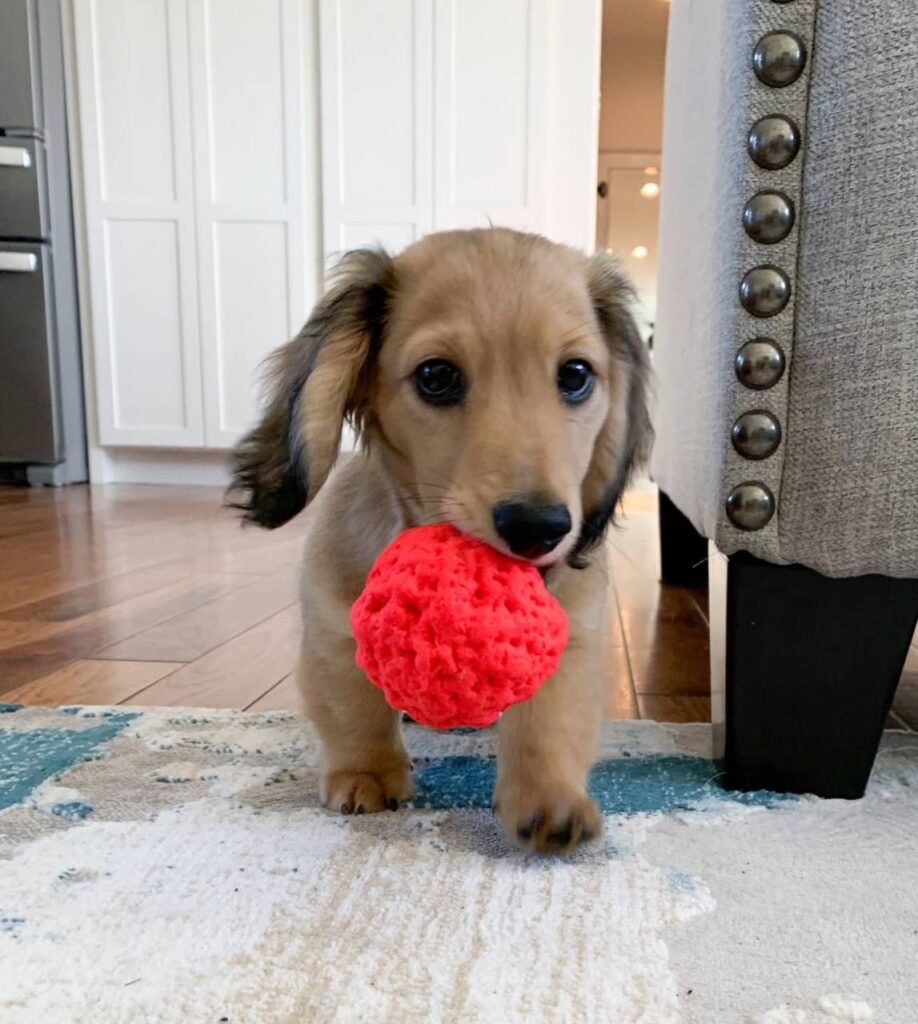Socializing a Mini Dachshund Puppy: Why It Matters More Than You Think
As a professional breeder here in California, one of the most important (and most overlooked) things I teach new owners is how crucial early socialization is for mini dachshund puppies.
I’ve raised these pups for years in my home-based program, and I can tell you from experience—a well-socialized dachshund is a happier, more adaptable dog.
Mini dachshunds are loyal, smart, and full of spunk. But if they don’t get the right exposure early on, they can become overly cautious, barky, or even fearful. Let’s make sure that doesn’t happen to yours.
Why Socialization Is So Important for This Breed
Mini dachshunds were originally bred to hunt. They’re alert, energetic, and protective—all great traits—but they can also be prone to barking and wariness of strangers if not properly socialized.
A well-socialized dachshund is:
- Less likely to develop fear-based behaviors
- More adaptable to travel, new environments, and family life
- Easier to train and integrate with children or other pets
I had a puppy named Milo go to a young couple in LA. Because of his early socialization here with other pups, kids, and everyday noise, he had no problem adjusting to apartment life—even the elevator!
When Should You Start Socializing a Mini Dachshund Puppy?
The Ideal Window: 3 to 16 Weeks Old
This is the critical learning period when puppies are like little sponges. What they experience during this time will shape how they react to the world for the rest of their lives.
That’s why I start gentle socialization at just a few weeks old, long before they ever leave for their new homes.
How I Socialize Mini Dachshund Puppies as a Breeder
Every puppy I raise is hand-raised in my home—not in a kennel or outdoor facility. Here’s how I make sure they’re well-prepped for life beyond my doorstep.
Human Interaction
- Daily handling by both adults and supervised children
- Exposure to gentle grooming (brushing, nail touches, ear rubs)
- Positive reinforcement with cuddles and play
By the time they’re ready for their forever homes, my puppies are comfortable being held, touched, and loved—which makes vet visits and training way easier later on.
Sound & Environment Exposure
- Background noise: vacuum, music, doors, TV
- Walking on different surfaces: tile, carpet, grass
- Early crate training and safe car rides
This helps prevent future fear responses to common household sounds or sudden movements.
Pet & Visitor Introductions
- Safe, slow introductions to other vaccinated adult dogs
- Interaction with a few calm cats and visiting children
- Watching human activity in the home like cooking or cleaning
My goal is to raise puppies who aren’t startled by new things—they’re curious and confident.

What Buyers Should Look for in a Well-Socialized Puppy
When you’re shopping for a mini dachshund puppy—whether through me or another breeder—be sure to ask how the puppies were socialized. Here’s what you should look for:
- Pups that approach you with curiosity, not fear
- Comfortable being picked up and examined
- Not overly shy, nervous, or aggressive with littermates
Ask if the breeder has:
- Introduced the puppies to different environments
- Handled them daily
- Observed their temperaments and personalities
I send all buyers detailed temperament notes, photos, and videos—plus
How to Continue Socialization at Home
Your job doesn’t end when your puppy comes home—you need to keep the momentum going.
Weeks 9–16: Focus on Familiarization
- Gently introduce friends and family
- Let your pup hear street sounds, kids playing, doors opening
- Create positive associations with new experiences
After First Vaccines
- Safe, short walks
- Puppy socialization classes
- Playdates with well-behaved dogs
- Visits to pet-friendly stores or parks
Living With Kids or Other Pets?
- Supervise early interactions
- Teach kids how to be calm and respectful
- Allow your pup to approach other pets at their own pace
Mistakes to Avoid When Socializing a Mini Dachshund Puppy
Even well-meaning owners can make a few missteps. Here’s what to avoid:
- Waiting too long to begin socialization
- Flooding the puppy with too much stimulation all at once
- Skipping the crate or isolating the puppy too much
- Using punishment-based corrections for fear responses
Take it slow. Keep experiences positive and low-pressure. It’s a journey, not a race.
Why Well-Socialized Puppies Are Worth the Investment
People often ask why my puppies cost more than those found on a random classifieds site. The answer is simple:
You’re not just buying a dog—you’re investing in a puppy who has been nurtured, handled, and prepared for a happy life with humans.
Socialization takes time, effort, and a commitment to quality. And honestly? It shows.
Families who bring home one of my pups regularly tell me how easy the transition was and how well-adjusted their dachshund is—even in busy households.
Ready to Meet Your Confident, Social Mini Dachshund Puppy?
If you’re looking for a mini dachshund puppy that’s already been socialized and prepped for real life, I’d love to help you.
– Visit my online pet shop to see puppies available for sale or adoption.
– Schedule a meetup with your potential pup and see how they interact in real-time.
-Use USDA-compliant, pet-safe shipping methods with tracking and updates.
Final Thoughts
Socializing a mini dachshund puppy isn’t optional—it’s foundational. Whether you’re buying or adopting, make sure your new best friend is being set up for a life of confidence, not fear.
As a breeder who lives and breathes dachshunds, I’m here to guide you every step of the way—from choosing the right pup to raising them right.
Have questions? Reach out. Let’s raise a happy, well-rounded dachshund together. 🐾
